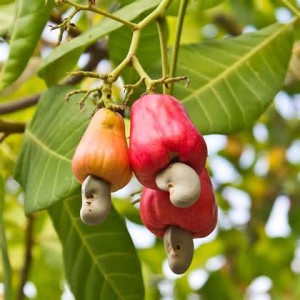(Anacardium occidentale) Cashew is a widespread tree, grown in all tropical countries. Generally it has a crooked trunk. The leaves are oval in shape with rounded tips. The yellowish flowers are small, crowned at the tips of the branches and the petals are sometimes with pink stripes. The fruit is pear-shaped, producing a kidney-shaped nut outside and under the fruit. The cashew nut is well-known as a delicacy.
Contents
Uses
- Diarrhea, diabetes, infectious swellings and mouth ulcers
- Relieves toothaches, sore gums, and dysentery
- Promotes the flow of urine
- Alcoholic solution of the pericarp is used to expel worms from the body. It is an effective insecticide.
Benefits
Cancer Prevention
Cashews are ripe with proanthocyanidins, a class of flavanols that actually starve tumors and stop cancer cells from dividing. Studies have also shown that cashews can reduce your colon cancer risk. Their high copper content also endows the seed with the power to eliminate free radicals and they are also good sources of phytochemicals and antioxidants that protect us from heart disease and cancer.
Heart Health
Cashews have a lower fat content than most other nuts and most of it is in the form of oleic acid, the same heart-healthy monounsaturated fat found in olive oil. Studies show that oleic acid promotes good cardiovascular health by helping to reduce triglyceride levels, high levels of which are associated with an increased risk for heart disease. Cashews are wonderfully cholesterol free and their high antioxidant content helps lower risk of cardiovascular and coronary heart diseases. The magnesium in cashews helps lower blood pressure and helps prevent heart attacks.
Hair and Skin Health
Cashews are rich in the mineral copper. An essential component of many enzymes, copper plays its part in a broad array of processes. One copper-containing enzyme, tyrosinase, converts tyrosine to melanin, which is the pigment that gives hair and skin its color. Without the copper cashews are so abundant in, these enzymes would not be able to do their jobs.
Bone Health
Cashews are particularly rich in magnesium. It’s a well-known fact that calcium is necessary for strong bones, but magnesium is as well. Most of the magnesium in the human body is in our bones. Some of it helps lend bones their physical structure, and the remainder is located on the surface of the bone where it is stored for the body to use as it needs. Copper found in cashews is vital for the function of enzymes involved in combining collagen and elastin, providing substance and flexibility in bones and joints.
Good for the Nerves By preventing calcium from rushing into nerve cells and activating them, magnesium keeps our nerves relaxed and thereby our blood vessels and muscles too. Too little magnesium means too much calcium can gain entrance to the nerve cell, causing it to send too many messages, and leading to too much contraction. Insufficient magnesium leads to higher blood pressure, muscle tension, migraine headaches, soreness and fatigue. Not surprisingly, studies have demonstrated that magnesium helps diminish the frequency of migraine attacks, lowers blood pressure and helps prevent heart attacks.
Prevent Gallstones
Data collected on 80,718 women from the Nurses’ Health Study demonstrates that women who eat at least an ounce of nuts each week, such as cashews, have a 25% lower risk of developing gallstones.
Weight Loss
People who eat nuts twice a week are much less likely to gain weight than those who rarely eat nuts. Cashew nuts are indeed relatively high in fat, but it is considered “good fat.” This is attributable to the ideal fat ratio in the nut, 1:2:1 for saturated, monounsaturated, and polyunsaturated, respectively, which is recommended by scientists for tip-top health. Cashew nuts contain less fat than most other popular nuts, including peanuts, pecans, almonds and walnuts. They are dense in energy and high in dietary fiber, making them a very valuable snack for managing weight gain
Cautions
Too much of a good thing can be bad for your health. Unless you are diligent in seeking out unsalted cashews, you may be adding significant amounts of sodium to your diet when noshing on this salty treat. An adult only requires 1,500 mg of sodium per day, while the tolerable upper limit for adults is 2,300 mg. A single ounce of cashews contains 5 mg of sodium, if they are unsalted. However, salted cashews can add 87 g of sodium per ounce. High sodium intake can leave to high blood pressure, stroke, heart disease and kidney disease.
Interactions
Cashews have a high magnesium content, generally 82.5 mg of magnesium per ounce. The University of Maryland Medical Center notes a number of drug interactions with magnesium. Quinolone antibiotics, such as ciprofloxacin, and magnesium bind together, preventing adequate absorption of the antibiotic. Magnesium may also interact with blood pressure medications and calcium channel blockers, increasing the likelihood of adverse side effects from the medications, such as nausea and water retention. Magnesium from cashews may also interact with diabetic medications, thyroid medications, diuretics and penicillamine. Pay close attention to drug information and if medications list magnesium as a concern, be aware that cashews may contribute to drug interactions.
Other names
cashews
References
Source: Healthmad, http://healthmad.com/alternative/cashew-medicinal-uses/
LiveStrong, http://www.livestrong.com/article/506270-negative-effects-of-eating-too-many-cashews/
Healthdiaries, http://www.healthdiaries.com/eatthis/7-health-benefits-of-cashews.html

